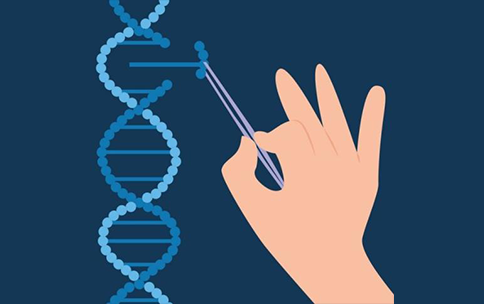
Many common and rare diseases are caused by harmful changes in DNA. Hutchinson-Gilford progeria syndrome (HGPS) is a rare disease that is caused by a DNA change that induces rapid aging and shortens lifespan. While millions of Americans live with rare diseases like HGPS, most have no treatment options available. Recent scientific advances in correcting harmful DNA changes have made it possible to treat and even cure some genetic diseases. However, one significant remaining challenge is to design different types of DNA editing tools to correct different types of harmful DNA changes. The NIH Common Fund’s Somatic Cell Genome Editing (SCGE) program is working to improve the efficacy and specificity of genome editing approaches to reduce the burden of disease caused by genetic changes.
In a groundbreaking study, NIH Director Dr. Francis Collins, and SCGE researcher Dr. David Liu, with their colleagues, used a genome editing tool that specifically targeted and corrected the disease-causing gene both in cells obtained from HGPS patients and in a mouse model of HGPS. The delivery of this tool into lab-grown cells from HGPS patients resulted in 90% of the cells containing the edited gene and a significant reduction in cellular abnormalities. A single use of the tool in the mouse model greatly extended lifespan from 215 to 510 days. Improved health in the aorta was also observed in the hearts of treated mice, which was particularly encouraging because deterioration of the aorta is a major contributor to disease and death in children with HGPS. Overall, these findings support the potential for genome editing tools to treat HGPS, and other genetic diseases, by directly correcting the root cause of disease.
Reference
- In Vivo Base Editing Rescues Hutchinson-Gilford Progeria Syndrome in Mice, Luke W. Koblan, Michael R. Erdos, Christopher Wilson, Wayne A. Cabral, Jonathan M. Levy, Zheng-Mei Xiong, Urraca L. Tavarez, Lindsay Davison, Yantenew G. Gete, Xiaojing Mao, Gregory A. Newby, Sean P. Doherty, Narisu Narisu, Quanhu Sheng, Chad Krilow, Charles Y. Lin, Leslie B. Gordon, Kan Cao, Francis S. Collins, Jonathan D. Brown, David R. Liu. Nature, 2021 January 6.


